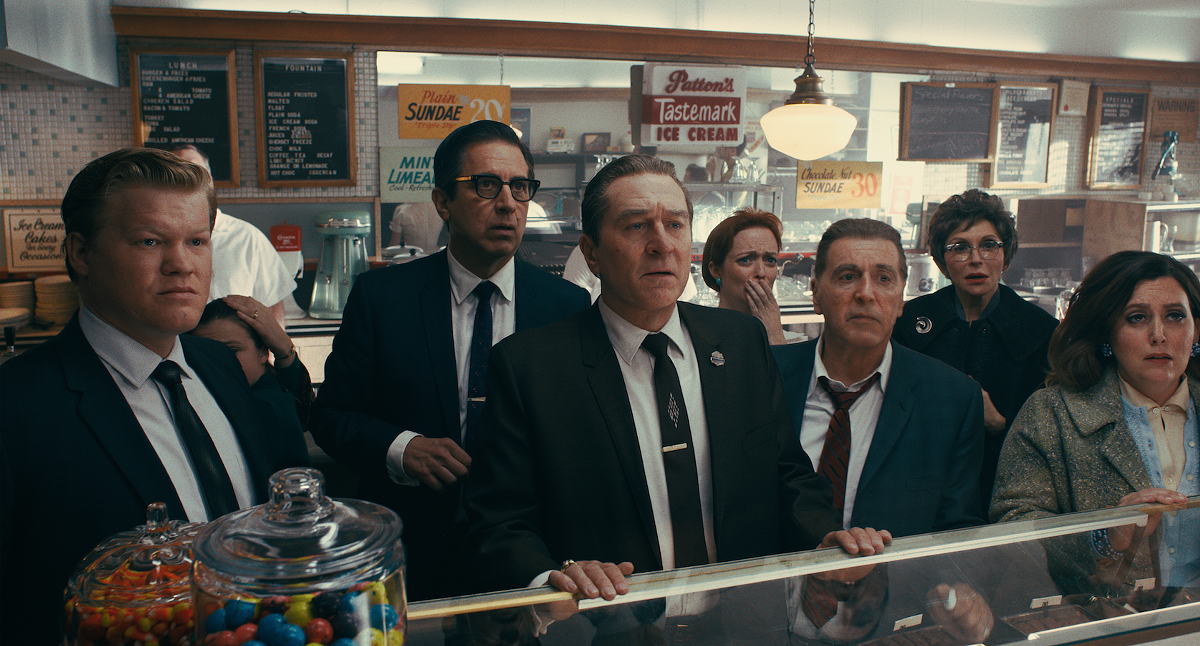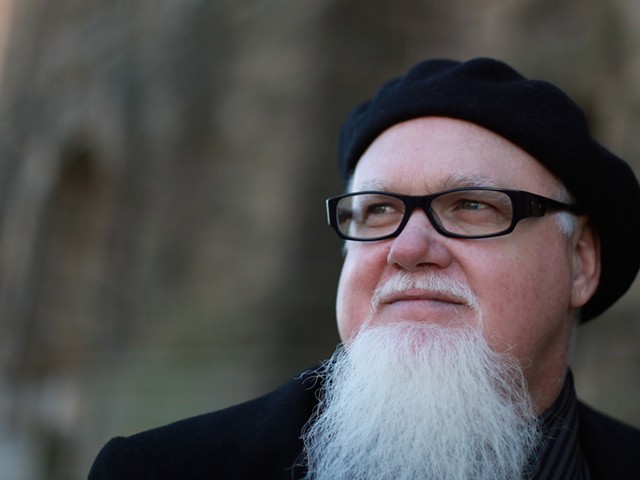Martin Scorsese returns to the scene of the crime in the elegiac, poetic, and sometimes lethargic The Irishman, a loving kiss-off to the gangster genre and perhaps, at 77, a final bow for the great director himself. In a film that often feels like a wake, the auteur has assembled an honor guard of heavyweights, with Robert De Niro and Al Pacino appearing together onscreen for the first time since 1995's Heat, and Scorsese favorites Harvey Keitel and Joe Pesci returning to the fold for one more go-round. To gather all this talent is an incredible feat, and the resulting production essentially amounts to a victory lap — a long, unhurried, and sometimes melancholy stroll through some very familiar territory.
De Niro plays the title character, Frank Sheeran, a vet turned truck driver, Philadelphia local union president, and, by his own admission, a hit man for a powerful crime family. A chance encounter with Boss Russell Bufalino (Pesci) at a truck stop, where the older man helps tighten Frank's timing belt, is the beginning of a career that will land Sheeran in the inner circle of underworld power and in the middle of the action for some infamous historic moments. Sheeran climbs the ranks, collecting payments, making special deliveries, and, once in a while, rubbing out a rival thug. The extent of his crimes is displayed in a very typical Scorsese montage, as Frank keeps tossing freshly used guns off a bridge into the Schuylkill River, with a small armory of murder weapons accumulating at the bottom. Sheeran is a good soldier, proving himself dependable and efficient and is embraced — even though, heaven forbid, he's not Italian, though he does speak the mother tongue, thanks to a combat tour of Italy in World War II, where we see in flashbacks how he developed a knack for killing without emotion.
This grace under fire, and his union membership, makes Frank the ideal candidate when International Brotherhood of Teamsters President Jimmy Hoffa (Al Pacino) finds himself in need of an enforcer. The charismatic and controversial Hoffa wields tremendous power, but his flair for showmanship and theatrics puts him at odds with La Cosa Nostra, who by nature favor discretion like Dracula craves the shade. Since no respectable bank will lend to them, the mafia turns the union's massive pension fund into a steady cash flow for a variety of real estate boondoggles, pet projects, and even the occasional legitimate business front, and Hoffa is eager to open the treasury in exchange for mob backing. This mutually beneficial arrangement works until Hoffa's very public feud with Bobby Kennedy leads to increased FBI scrutiny, and ultimately a jail sentence. Later, as a paroled Hoffa struggles to regain his old position, he increasingly clashes with the bosses, a tension that forces Frank to decide where his true loyalty lies.
All the many threads in this lengthy and deliberately paced potboiler lead to a fateful lunch date at the Machus Red Fox, the Bloomfield Township eatery where Hoffa was last seen July 30, 1975, a climax that anyone of a certain age can see rolling down the boulevard long before the film pulls into the parking lot. Hoffa, and his disappearance, has held a certain fascination for Baby Boomers for half a century, and has left everyone born after puzzled about what the big deal was. Hoffa was a hotheaded hustler with a gift for gab — but he was a thug, not a hero. Al Pacino works hard to make Hoffa into a sympathetic figure, but he feels less a person than a collection of Pacino's oversized acting tricks. It all feels like surface detail. For instance, we learn of Hoffa's love of ice cream and ginger ale, but not what fuels his appetite for power. This same hollowness plagues the lead and all of his lowlife pals, men who seem devoid of inner lives, no matter how closely the camera zooms in and lingers on their wrinkled mugs. As the story spans nearly 60 years, those faces are often CGI-scrubbed and "de-aged," and though the process works better here than ever before (see the Will Smith-starring Gemini Man), it's still distracting.
Make no mistake: This is gorgeous, top-notch filmmaking, complete with glorious cinematography and swooning doo-wop soundtrack. But after hitting the pinnacle with 1990's Goodfellas, which remains the definitive statement on the mafia, Scorsese has set a bar it's impossible for even him to vault. It's hard to call a film this well-made a disappointment, but the three-and-a-half hours spent in the dark with these bad, bad men left me feeling empty.
If anything, it's tempting to read this as an apology for romanticizing creeps. Where Ray Liotta's Henry Hill in Goodfellas adored the lifestyle and desperately wanted to be a gangster, here De Niro's character seems to have just drifted into it. Watching these tough guys live out their golden years in prison, or a nursing home, is a pathetic spectacle. Sheeran's eldest daughter, beautifully played as an adult by Anna Paquin (though she only has a few lines), provides the moral center; she turns her back on her father and his friends and refuses to forgive him, even when he begs. In the end, there's a price to pay for a life of crime, and it's too steep a tab for any soul to cover.
Stay on top of Detroit news and views. Sign up for our weekly issue newsletter delivered each Wednesday.






